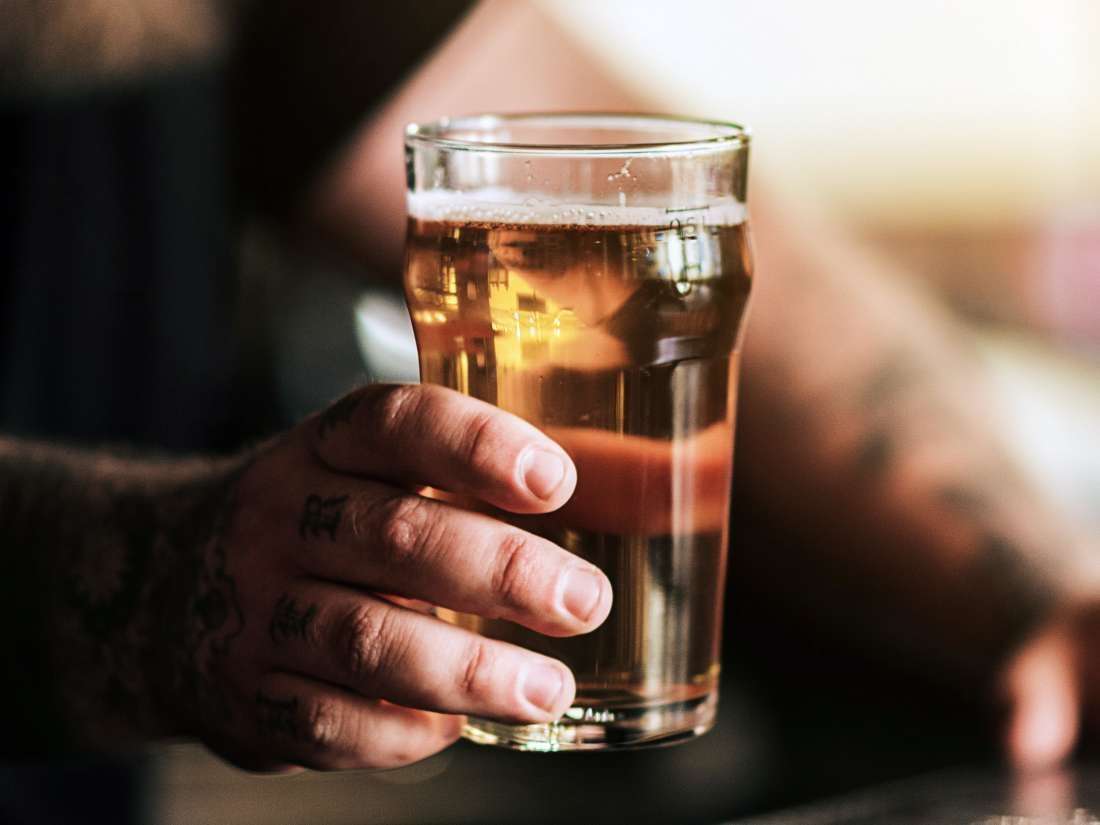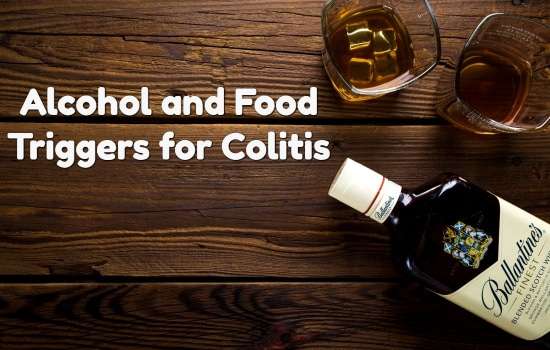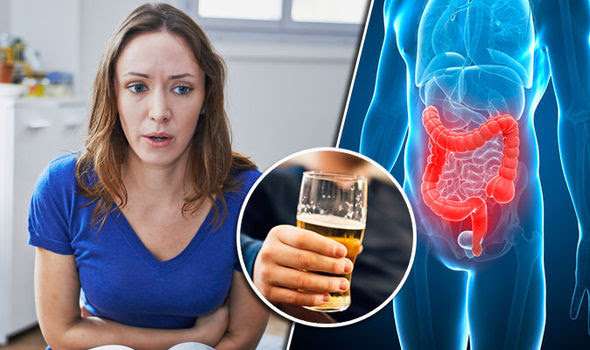Potential Links Between Alcohol & Ulcerative Colitis
Alcohols link to ulcerative colitis and other inflammatory bowel diseases is due to a number of factors.
Drinking alcoholic beverages can cause flare-ups of disease activity for IBDs that were there, but not causing any symptoms. Alcohol may also lead to an increased risk of developing UC.
Not all inflammatory bowel disease patients experience symptoms all the time. Many have an inactive form of IBD. UC flare-ups after drinking alcohol may be due to alcohol weakening the immune system, which can then lower your chances of fighting off diseases.
Alcohol can cause inflammation in the gut similar to the effects of UC. Alcohol may also increase the permeability of the small and large intestines, which is a risk factor in many IBDs.
Symptoms Of Ulcerative Colitis
The exact symptoms that people will experience will depend on where the inflammation occurs but can involve:
* Rectal bleed* Anemia is a lack of healthy red blood cells and it is caused by rectal bleeding.* An urgent need to defecate* Rectal pain* Loss of fluids and nutrients from the body.* Children with UC may fail to develop normally* Skin lesions* Rectal Tenesmus means that the individual feels unable to empty their bowels when they are defecating.* Abdominal cramps* Feeling tired all the time
Those individuals who have fulminant colitis can experience:
* Extreme abdominal pain* Excessive bleeding from the anus* Severe diarrhea
Alcohol And Ulcerative Colitis Flare
Common effects of alcohol can exacerbate IBD symptoms and contribute to the worsening of your condition. One study has found about 75 percent of people reported a worsening of IBD symptoms after consuming alcohol.
Certain properties of alcohol are likely responsible for the increased risk of IBD flare-ups. For example, alcohol is a natural diuretic that can leave you dehydrated and cause diarrhea by stimulating the intestines. Carbonated alcohol beverages can cause you to be gassy. A healthy balance of bacteria in the gut is important for normal digestive functions, but alcohol can disrupt the amount, diversity, and balance of bacteria in your GI tract. Alcohols irritation of the GI tract lining can also lead to rectal bleeding and poor nutrient absorption in some people.
Studies have shown that alcoholic beverages that contain a large amount of sugar, in particular, may increase abdominal pain and discomfort among people who have UC. A MyCrohnsAndColitis team member noticed the same effect with sugar, stating that Sugar in alcohol gets me every time. Sparkling wine is reported to be well-tolerated by people with ulcerative colitis, compared to other alcoholic beverages.
The consumption of red wine has also been linked to long-term risk for relapse and flare-ups in people with inactive UC due to an increase in permeability in the intestines.
- Anemia
- Gastritis
- Malnutrition
Don’t Miss: Ulcerative Colitis Surgery Pros And Cons
Ive Been In Your Shoes
I remember what its like to be in my early 20s where I hit the club like 3-4 times a week. It can be difficult to go out with your friends and feel like the odd ball. You might slip up and I wrote this article to help you get through these times.
Remember youre playing the long game right now, which is to achieve long term remission. Once you heal your gut you can be less strict. I believe that once you experience what it feels like to feel truly awesome, you wont care about being like everyone else.
Youre Not Drinking Enough Fluids

If youre experiencing a bout of diarrhea, you run the risk of becoming dehydrated because your body is losing more fluids than its taking in. This can be harmful to your overall well-being and interfere with your bodys ability to heal.
Drink as much water as you can during a UC flare. Just keep in mind that there are some liquids you should think twice about if you have diarrhea, including pear, peach, or prune juice, according to the Crohns and Colitis Foundation all of them contain nonabsorbable sugars that can be rough on your gut.
Don’t Miss: What Is The Best Treatment For Ulcerative Proctitis
Causes And Risk Factors Of Ulcerative Colitis
The exact cause of ulcerative colitis is still unknown, but there are a few suspected conditions that may aggravate it.
Diet and stress are two risk factors that can make Ulcerative colitis worse, but not necessarily cause it.
Some research studies are focused on the nature of ulcerative colitis being an autoimmune condition.
The immune system is the bodys way to protect itself by attacking foreign bodies like viruses and bacteria.
This process sometimes fails due to certain factors, making the body attack its own cells. Cells in the digestive tract may be mistakenly attacked, causing ulcerative colitis.
Another cause thought to explain ulcerative colitis is heredity. It is noted that family history is apparent in some, but not all, people with ulcerative colitis.
Statistics suggest that ulcerative colitis equally affects men and women. Its risk factors include the following:
Effects Of Drinking Alcohol With Uc
The irritating effects of alcohol can mimic and worsen the symptoms of UC. In general, if you have any form of IBD, you should avoid all alcohol consumption. Since alcohol can mimic a lot of the symptoms of UC, it may cause more harm for those that consume alcohol on a regular and long-term basis.
- Damage to the lining of the intestines
- Gastroparesis
Notice how many of the above symptoms are the same as UC. Chronic use of alcohol can not only mask but can worsen the disease course of IBD.
Also Check: Easy To Digest Foods For Ulcerative Colitis
Ulcerative Colitis Nursing Care Plans Diagnosis And Interventions
Ulcerative Colitis NCLEX Review and Nursing Care Plans
Ulcerative colitis is a medical condition that involves the inflammation and ulcer formation in the lining of the colon and rectum.
It is a type of inflammatory bowel disease that can have progressive symptoms over time and could be both debilitating and life-threatening if left uncontrolled.
There is no cure for ulcerative colitis yet, so the treatment is aimed at the reduction of signs and symptoms of this condition, and the prevention of complications.
Everyone’s Uc Triggers Are Different
For others, alcohol consumption might provoke that “ring of fire” or relapse into a UC flare. Sulfites found in alcoholic beverages could compound the gut permeability and create a higher risk of intestinal pain and bouts of diarrhea.
With this stated, no two cases of UC or Crohns are the same. I think if you find drinking causes you pain or elicits any other negative symptoms, then just avoid it. Just say “No” to “firewater” or “giggle juice.” Its not suited to your body.
And lifes too short to wake up the next day in pain.
Recommended Reading: Zinc Oxide For Stage 2 Pressure Ulcer
Inclusion Criteria And Exclusion Criteria
All IBD patients included in the study had biopsy proven CD or UC. IBS patients had to meet the Rome II criteria for IBS, and have a normal colonoscopy and normal random colonic biopsies if the primary symptom was diarrhea. Patients were eligible to be included in the study if the clinician who saw them at the time of inclusion determined that they currently had inactive disease. The status of disease for IBD patients was then confirmed using IBD clinical indices CDAI < 150 or UCAI < 4 for inactive disease. Patients were excluded from the study if they reported active disease in the three months prior to the enrollment.
Who Diagnoses Ulcerative Colitis
If you have symptoms of ulcerative colitis, your regular healthcare provider will probably refer you to a specialist. A gastroenterologist a doctor who specializes in the digestive system should oversee the care for adults. For young patients, a pediatric gastroenterologist who specializes in children should manage the care.
Read Also: Why Do You Get Mouth Ulcers
Check Out Some Relatable Situations And How To Deal With Them
Everyday struggles can come with having ulcerative colitis like socializing or traveling. But the best way to navigate life with UC is to seek an effective treatment plan. Beyond that, its helpful to maintain a hopeful outlook, healthy lifestyle, and strong support networkand strive to lead a full life.
What Should I Ask My Doctor

If you have ulcerative colitis, you may want to ask your healthcare provider:
- How much of my large intestine is affected?
- What risks or side effects can I expect from the medication?
- Should I change my diet?
- Will ulcerative colitis affect my ability to get pregnant?
- What can I do at home to manage my symptoms?
- What are my surgical options?
Recommended Reading: What To Drink With Stomach Ulcer
Side Effects Of Mixing Ulcerative Colitis Meds And Alcohol Can Include
- Death
Interestingly, it is impossible to tell what effect ulcerative colitis meds and alcohol will have on an individual due to their own unique genetic make up and tolerance. It is never advisable to mix ulcerative colitis meds and alcohol due to the chances of mild, moderate and severe side effects. If you are having an adverse reaction from mixing ulcerative colitis meds and Alcohol its imperative that you head to your local emergency room.
Youre Not Avoiding Trigger Foods
Theres no food or food group that causes or cures ulcerative colitis, Yun explains. But many people with UC say that certain foods either bring on symptoms or make them worse.
During a flare-up, your doctor may recommend adjustments to your diet. This can mean avoiding foods that trigger symptoms such as bloating, diarrhea, or cramping. For example, dairy products can be particularly irritating for people who have both UC and lactose intolerance.
Aside from dairy, common trigger foods include beans, whole grains, nuts, seeds, some raw fruits and vegetables, high-fat foods, sugary foods, and sugar alcohols. If youre trying an elimination diet to determine which of these foods you need to avoid, keep a food diary, and always work with a healthcare practitioner to ensure youre getting all the nutrients you need.
Don’t Miss: What Does Asacol Do For Ulcerative Colitis
Can I Get Surgery For My Ulcerative Colitis
Surgery is an option if medications arent working or you have complications, such as bleeding or abnormal growths. You might develop precancerous lesions, or growths that can turn into colorectal cancer. A doctor can remove these lesions with surgery or during a colonoscopy.
Research shows that about 30% of people with ulcerative colitis need surgery sometime during their life. About 20% of children with ulcerative colitis will need surgery during their childhood years.
There are two kinds of surgery for ulcerative colitis:
Proctocolectomy and ileoanal pouch
The proctocolectomy and ileoanal pouch is the most common procedure for ulcerative colitis. This procedure typically requires more than one surgery, and there are several ways to do it. First, your surgeon does a proctocolectomy a procedure that removes your colon and rectum. Then the surgeon forms an ileoanal pouch to create a new rectum. While your body and newly made pouch is healing, your surgeon may perform a temporary ileostomy at the same time. This creates an opening in your lower belly. Your small intestines attach to the stoma, which looks like a small piece of pink skin on your belly.
After you heal, waste from your small intestines comes out through the stoma and into an attached bag called an ostomy bag. The small bag lies flat on the outside of your body, below your beltline. Youll need to wear the bag at all times to collect waste. Youll have to change the bag frequently throughout the day.
How Do You Stop A Colitis Flare
More Tips to Ease Ulcerative Colitis Symptoms
When you have a flare, try to follow a low-residue diet for several weeks, Damas says. The goal is to let the colon rest by avoiding fiber. That means staying away from seeds, nuts, fresh fruit, dried fruit, raw vegetables, whole grain bread and cereal, and tough meat.
Also Check: Can Stomach Ulcer Cause Fever
Coping With Stress And Ulcerative Colitis
To reduce ulcerative colitis flare-ups, it isnt always enough to take your medication and stick with your doctors treatment plan. Its can also be helpful to find ways to lower your stress level. Here are some strategies to help you manage stress:
Ulcerative Colitis And Colorectal Cancer
Ulcerative colitis increases the risk of colorectal cancer. Colorectal cancer often begins as small growths on the inside of the large intestine. The risk of colorectal cancer increases based on:
- the length of time a person has had ulcerative colitis
- how much of the colon is affected by ulcerative colitis
People with ulcerative colitis should have more frequent tests for polyps and colorectal cancer than people at average risk. The gold standard screening test is a colonoscopy. Polyps can be removed during a colonoscopy. This reduces the risk of colorectal cancer. Ask your doctor how often you should be checked for colorectal cancer.
Surgery to remove the entire colon eliminates the risk of colon cancer.
Also Check: What Does Ulcerative Colitis Mean
Youre Skipping Your Uc Medications
The most important thing to do if you have UC? Take your medications as prescribed and work closely with your doctor to stay well, says Richard Bloomfeld, MD, a gastroenterologist and professor at Wake Forest Baptist Medical Center in Winston-Salem, North Carolina.
A variety of medications can treat UC, depending on the severity of your condition and your overall health. It may be tempting to skip doses once you start feeling better: A Canadian review published in January 2013 in the journal Gastroenterology found that out of 1,681 people with UC, the majority did not adhere to their treatment after one year.
Skipping medications is the biggest reason people experience flares, says Laura Yun, MD, a gastroenterologist and assistant professor of medicine at Feinberg School of Medicine at Northwestern University in Chicago. Whether your doctor has you taking an anti-inflammatory drug, an immunosuppressant, or a combination of medications, none of them will work if you dont take them as your doctor prescribes.
What Type Of Alcohol Is Best For Ibd

A small group of Crohns disease patients was studied by Swanson to see how alcohol affected them. In his study, he found that people who drank one to three glasses of red wine a day for a week had lower levels of a protein called calprotectin, indicating that their digestive tracts were less inflammatory.
Don’t Miss: Classic Features Of Ulcerative Colitis
When Could Drinking Be Problematic
Some people may feel that they cant control their drinking, have negative feelings when they dont drink, or generally feel that their alcohol consumption is negatively impacting their life. These factors may be signs of alcohol use disorder. If you feel as though you cant limit how much you drink or you continue drinking even though its hurting you or those around you, its time to talk to your doctor.
Whether you decide to continue your current alcohol intake, reduce your alcohol consumption, or eliminate alcohol altogether, its important to listen to your body and have open conversations about these topics with your health care team. They are your best resources for getting medical advice when it comes to limiting the negative effects alcohol has on you and your life.
Disruption Of Gut Bacteria
A healthy balance of bacteria in the gut is important for normal digestive functions. Alcohol can disrupt the amount, diversity, and balance of bacteria in anyones digestive tract, whether or not they have IBD. When alcohol irritates the GI tract lining, it can also lead to rectal bleeding and poor nutrient absorption in some people.
Also Check: Bone Broth And Ulcerative Colitis
Nursing Care Plan For Ulcerative Colitis 2
Nursing Diagnosis: Imbalanced Nutrition: Less than Body Requirements related to altered absorption of nutrients secondary to Ulcerative colitis, as evidenced by diarrhea, abdominal pain and cramping, weight loss, nausea and vomiting, and loss of appetite
Desired Outcome: The patient will be able to achieve a weight within his/her normal BMI range, demonstrating healthy eating patterns and choices.
Navigating Social Situations With Uc
The possibility of a UC flare may keep some people from enjoying an active social life. But there are a few ways to plan ahead that may help you feel more comfortable going out.
Know what to expect where youre going. Whether you have access to a bathroom if you need one or whether taking a change of clothes makes sense can be part of your routine when getting ready.
Alcohol, smoking, and drugs affect each person with UC differently. But they may pose health risks to your gastrointestinal tract and affect your medications. Remember to ask your doctor for more information.
You may have questions about navigating relationships with UC. You may already know that being honest with your friends and partner is importantand so is your comfort level when talking about your UC. Learning to talk about it can help you feel more understood by othersand help others find better ways to support you when you need it.
Don’t Miss: How To Heal Duodenal Ulcer